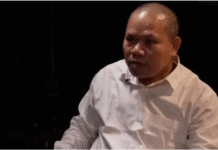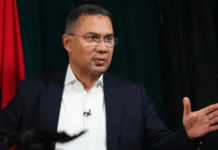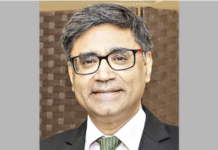Discriminatory development and paddy prices
 While handing over vehicles to the upazila agriculture officers, the agriculture minister said that the farmers are not getting good prices for their paddy because of development. That was quite a significant statement, though the media hardly gave it due coverage. The minister’s words were lost in the deluge of other sensational news that hit the pages every day.
While handing over vehicles to the upazila agriculture officers, the agriculture minister said that the farmers are not getting good prices for their paddy because of development. That was quite a significant statement, though the media hardly gave it due coverage. The minister’s words were lost in the deluge of other sensational news that hit the pages every day.
Just the Chhatra League committee news alone took up so much media space. You can even list the news items covering the issue: 1. Posts in the committee allegedly being sold, 2. Shibir activists find their way into committee, 3. Fights in Madhur Canteen over attack on those deprived of posts, 4. An activist who had assaulted a female student, almost stripping her of the clothes, beaten by his own party comrades, 5. Attack on female student leaders who came to reach an understanding late at night at TSC despite common girl students being attacked during the quota reform demonstrations, 6. Sit-in at the Raju sculpture by those deprived of posts, 7. Female associates criticise the characters of Chhatra League leaders on TV and in the social media, 8. Awami League leaders intervene and assure a solution, and, 9. A recently expelled Chhatra League female leader attempts suicide.
When those in the habit of assaulting the opposition have no opposition to attack, they merely turn inwards and begin to lash out among themselves. It is as if they have to keep their assaulting skills in practice.
Then there is the incident of the DUCSU VP being roughed up and prevented from attending iftar. There are the pictures of Chhatra League leaders posing with sheaves of paddy by the side of the farmers. Why should they be left of out of all this publicity?
The agriculture minister’s statement and the upazila agriculture officers being given vehicles give an accurate reflection of Bangladesh’s present vision of development. These vehicles are symbols of this development. These vehicles depict development at the rural level, no matter how dilapidated the roads may be. Even if the motive is to appease the bureaucrats, it serves the purpose of showing how determined the government is to activate the agriculture officers to promote agriculture at the grassroots.
The minister’s words make it clear that the development of agriculture does not mean development for the farmers. He says that the harvest has been good because of development. No one is really bothered that after producing this bumper crop, the farmers have lost everything, failing to sell their produce.
Had the interests of the farmers been the government’s priority, then they could never have staged the farce of handing over these hundreds of vehicles while the frustrated farmer set fire to his fields in despair. The minister can give priority to high yield crops, advanced agricultural technology, seeds, fertiliser and pesticides and give incentives to the agriculturalists to manage all this, but none of this amounts to anything if the farmer does not get the price for his crops. It would be better for the farmer to give up on cultivation.
Perhaps the food minister is two steps ahead of the agriculture minister when it comes to this development doctrine. What else could explain his belief that the farmers’ frustration is actually a form of sabotage? While inaugurating the government’s boro procurement drive on 15 May in Sirajganj, the food minister Sadhan Chandra Majumdar said, “Certain vested quarters instigated the farmer to set fire to the fields in order to harm and embarrass the government.” He had been a businessman before becoming a minister. He dealt in food products, paddy in particular. He should be knowing the actual picture. He must be fully aware how vulnerable the farmers are when it comes to the government’s rice procurement and how the profits are reaped by the middlemen and the rice mill owners.
It is also no secret how the ruling party leaders and activists also make money out of the entire process, in collusion with the government officials. That is why perhaps he mentioned at the programme that the ruling party people wouldn’t create any problems.
Yet amidst all of this, news emerged of a UNO and a deputy commissioner standing out as exceptions, by taking initiative to procure paddy from the farmers directly. But everywhere else, farmers were deprived of such an opportunity. The government procurement of only 10 per cent of the total production is certainly not adequate to resuscitate the market. The government can spend billions to write off the loans of the big bank loan defaulters, but cannot do anything to compensate the poor farmers’ losses.
There has been a news report of a poor farmer in Bhangura, Pabna, committing suicide because he could not afford to buy his children new clothes for Eid. Will he too be accused of sabotage? Five years ago a minister openly shed tears in front of a TV camera because his dream of being given a place in the new cabinet was crushed. What will the reaction then be of the poor farmers, who produced bumper harvests, whose dreams are smashed?
If the government pays a specific price above the production costs of paddy when procuring the grain, then market prices will go up. This process has been in place for long. But this time things have become complicated because: 1. The harvest has been more than expected, 2. The government has unnecessarily imported rice, 3. There is no space in the warehouses as the previous stocks remain unused, 4. There is the organised syndicate of the middlemen and the rice mill owners, and 5. There is the commission skimmed off by the local leaders of the ruling party in the procurement process.
Given the economic theory of supply and demand, it is the import of rice that that thrown the entire process out of kilter. There is an explanation for this excessive rice import and that may be found in the contention of CPD that huge amount of capital was siphoned off from the country during the last election. So with this wealth mounting up for handful of importers and middlemen, there is no question of any relief for the disheveled farmers.
Last year and early this year, there was an unprecedented uprising of farmers in India, who went as far as to stage long marches to Delhi and Mumbai. As in any democratic system, the leaders were forced to take the farmers’ demands into cognisance.
But it is quite different in Bangladesh. In this fragile state of democracy, even the left-wing politicians have turned away from the farmers. The question is, if the government can spend millions and millions to write off bad loans, give all sorts of concessions to loan defaulters and offer tax exemption to big businesses, why is it so unwilling to extend a helping hand to protect these endangered farmers? The answer is there, written on the wall, but the courage to speak out has dwindled.
It is not the interests of the majority that is served by the government’s development doctrine, but that of a handful of beneficiaries. That is why discrimination and inequality continue to grow in the country. Setting fire to the rice field is a blatant rejection of such discriminatory development.
* Kamal Ahmed is a senior journalist. This piece appeared in the print edition of Prothom Alo and has been rewritten by Ayesha Kabir









